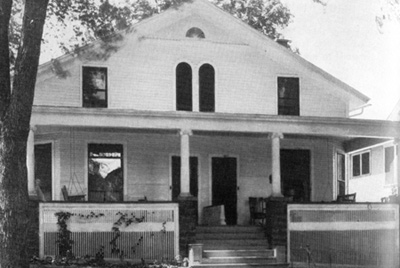The popular twentieth-century American humorist, Ellis Parker Butler, was born in a modest frame house at 607 West Third Street in the then boisterous steamboat town of Muscatine. Located in Iowa about two hundred and seventy miles north of Mark Twain's boyhood town of Hannibal, Muscatine is today a sizable manufacturing city and trading center, noted especially for its production of pearl buttons.
At the time of Butler's birth, December 5, 1869, the family home occupied the rear of the lot on Third Street. His father was Audley Gazzam Butler, who had married the former Adella Vesey of Muscatine. As a boy, Ellis lived the normal life of a Muscatine youth, with frequent adventures on the muddy banks of the great Mississippi. His imagination was aroused by the white packets on the broad river and by the activity of Negro stevedores on the Muscatine wharf. All of these youthful impressions are described in Kilo, a book about his boyhood days.
A few years after his graduation from high school Butler became a contributor of humorous articles to the Midland Monthly, the first of the many Iowa "little magazines" that have encouraged the creative spirit in the Middle West. It was established in 1894 by Johnson Brigham, state librarian of Iowa. Recognizing his young contributor's ability as a humorous writer, Johnson Brigham urged Butler to develop and perfect his sprightly talent. After his marriage in 1899 and the birth of his first child, Butler left the Third Street house in Muscatine and went to New York to join the staff of a trade magazine. He eventually became editor and owner of the magazine, Decorative Furniture [sic]. It was at this period that his first book, and only serious one, was published, a volume on furniture entitled French Decorative Styles.

Meanwhile he continued writing humorous articles for national magazines and his talent as a humorist came to the attention of Ellery Sedgwick, then editor of the American Magazine and afterward the famous editor of the Atlantic Monthly. Encouraged by Sedgwick, the former Iowa resident wrote the story called "Pigs Is Pigs." In The Happy Profession Sedgwick tells about how the story came to be written.
"One morning a friend confided to me that coming to town on the train he had overheard a discussion between two railroad clerks as to the proper subclassification of guinea pigs as an item of freight. I knew the happiest humorist of my acquaintance would appreciate that. At the time, Ellis Parker Butler was editing a magazine devoted to the interest of wallpapers. Now there is little in life less congenial to the moods of humor than wallpapers, and I was forever prodding Ellis to turn to a more expansive vocation. This was my chance. I asked him to lunch, embellished the tale here and there with the slightest touches of fancy, and turned it over to him. Within a week he had transformed it into a thing of beauty and a joy forever. Three months later 'Pigs Is Pigs' was recognized as a classic."
After its publication in a book in 1906, it became a best seller and continued to be widely read for several decades. His career as a humorist now launched, Butler turned out one book after another at almost yearly intervals. He published thirty-two in all. Among them were The Incubator Baby, Perkins of Portland, The Great American Pie Company, Confessions of a Daddy, and a whole series on the correspondence school detective, Philo Grubb [sic]. Kilo, the nostalgic recollections of his boyhood days in Muscatine, was published in 1907.
Although none of Butler's later books achieved the tremendous popularity of Pigs Is Pigs, they all won wide circulation and earned more than a comfortable living for their author. During most of his writing years, Butler's home was at Flushing, Long Island, but he was living in Williamsville, Massachusetts, when he died in 1937.
Although Butler's birthplace in Muscatine is now privately owned, it is often viewed by admirers of Butler's writings. The two-story white frame house -- displaying a few interesting ornamental details like the fanlight under the cornice of the facade -- was moved to the front of the old Butler lot in 1909 and since then has been remodeled into a two-family residence with a new porch added to the front. Of equal interest with the house is the collection of Butler letters, manuscripts, and first editions on display in the P. M. Musser Public Library at Muscatine.